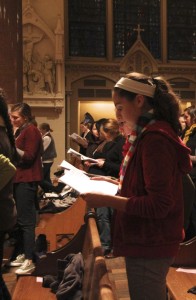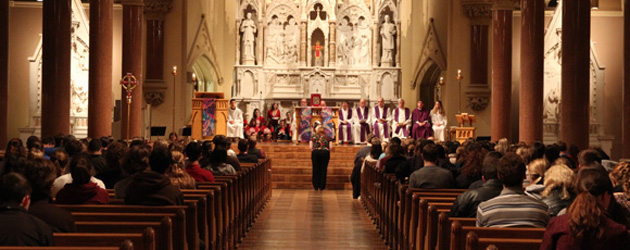When William O’Brien, S.J., celebrated Mass on Monday, Nov. 28, he said he found the experience to be a bit awkward.
“It was clumsy,” O’Brien said. “People laughed, not disrespectfully, but this will take some getting used to.”

The reason for the laughter was no fault of O’Brien’s, but the result of the changes and new translation of the Catholic Mass that were officially instated in Saint Francis Xavier College Church on Sunday, Nov. 27.
The changes to the Mass are a part of a larger movement within the Catholic Church to bring the language and meaning used in the Mass closer to the original Latin translation. One example includes the response to the peace offering. The old response, “And also with you,” has now been changed to “And with your spirit,” to reflect the original Latin phrase of “Et cum spiritu tuo.”
Liturgical Coordinator and Campus Minister Abigail Braun said she has heard a variety of perspectives from the students on the changes, but does not believe they will hurt the strength of a student’s faith.
“I think a lot of people will have opinions, good or bad,” Braun said, “But it wont have a real drastic effect on the prayer life of students.”
The changes have been meet with mixed reviews from students who have attended Mass since the switch to the new translation.
Senior Megan Dieselmier said she likes how the language has changed and thinks it is for the better.
“I like the changes. I like that they unite us linguistically,” Dieselmier said. “I like that it is a closer, more precise translation of the Latin because it gives us a better picture of what we’re saying.”
Freshman James Ideker, on the other hand, said he thinks the new diction of the Mass takes something away from the liturgy.
“The point of the Mass is to have that personal experience with God within the community,” Ideker said. “When they changed the Profession of Faith to ‘I’ instead of ‘we,’ we lose that sense of community. I feel the meaning isn’t the same without the community.”
According to Braun, the new changes come from the updated third edition of the Roman Missal, the book of prayers and responses used in the Mass. This is the third edition published in Latin, and since some of the Latin has been updated, it will also shift what is said in English.
“With Vatican II, the Mass was published in Latin,” Braun said. “After Vatican II, it was translated into English, to encourage people to participate in the Mass and understand what they are doing more.”
Braun said that some of the more dramatic changes come from a document created by a committee in Rome that addressed the process of translation.
“At the time of Vatican II, the primary translation principle they used was called dynamic equivalence, or trying to capture the spirit of the text,” Braun said. “This committee said that the Latin so it’s a more literal translation.”
It is because of the switch to a more literal translation that some of the old responses used in the Mass have been update to better fit their meaning in Latin.
To prepare for the changes, O’Brien and Braun gave two presentations at Saint Louis University, which outlined what could be expected from the new Mass.
Braun said that while she understands there will be conflicting opinions on the new translations, she said she believes having a dialogue about it is important.
“We’re in a university setting, where we are encouraging students to think critically and engage all parts of their lives, including their faith, using their intellect to ask questions,” Braun said. “The Magisterium in Rome says we need to adhere more to the Latin, and that’s the reality we have.”
John Kavanaugh, S.J., a philosophy professor, said that while the changes may be challenging to some, he does not believe the new parts of the Mass will change what the central purpose of what the service is about.
“It’s really a celebration of something that God does for us, and that’s why we can celebrate in any country of the world, regardless of language,” Kavanaugh said. “It’s the action that’s important.”
Kavanaugh said that he believes the bishops wanted the mass to have a more formal translation so that Catholics would not forget to believe in the transcendent reality of God. He also said that the changes will be difficult for some people who have grown up with the old Mass, but he thinks the actual difference will be small.
“Most people realize this is a secondary thing,” Kavanaugh said. “It’s understandable that they think of the liturgy as a central thing that unifies us, but especially in a parish like ours, the difference will be minimal because we are already deeply committed to the transcendent. We have a sense of celebration of God.”
While both Kavanugh and Braun said that they do no believe the changes will impact the role of the Mass, Braun said students are still divided in their opinions on the changes. and that some students are excited about them
“Some students are excited about it,” Braun said. “They think it will encourage them to pay more attention, to think more deeply and reflect more deeply on the words they say during mass.”
Braun also said that a lot of students are pleased with the universality of the new language. Since the new English translation is closer to the Latin, the Mass in different languages and countries will be similar in meaning.
While the language is unifying, Braun said that other students are frustrated that the language has not become more inclusive.
“Part of the concern is that this new translation is actually a step backwards,” Braun said. “There is still exclusive language in the mass. Most of the language we use to refer to God and humanity is still masculine.”
Another concern students have voiced is that the new translation values the literal meaning of the text rather than the spiritual context. Some students said they feel the language used is loftier and more poetic than the old mass, and therefore moves the mass further from our lives.
“It’s a fine line we walk between saying the mass is a place where we encounter God, who we can never comprehend,” Braun said. “And yet it is also where we encounter God who is one of us, who became flesh and walked with people in their everyday lives. Some people think the loftier language will bring us deeper into the mystery, but others think mass should be an encounter with God in the midst of our lives.”
While views on the changes vary on SLU’s campus, O’Brien said he believes that though the changes will take some getting used to, they will add a new dimension to the liturgy.
“I find it awkward, but the more formal prayer language distinguishes liturgical action from normal action,” O’Brien said. “The new translation has opened an opportunity for a new conversation with God.”












